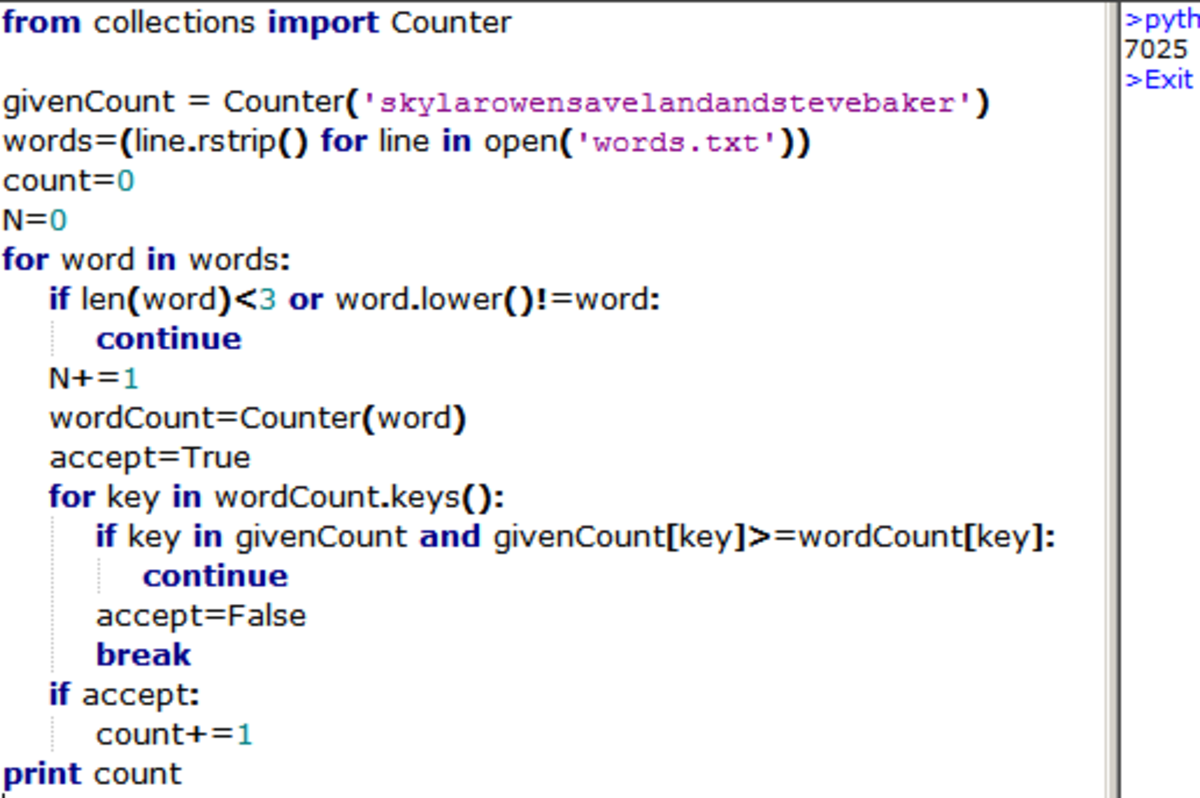How many words can be made from these letters?
Using the letters in the string,
skylarowensavelandandstevebaker
, how many words from
this list
can you make which are at least 3 letters long? (Case matters)
The answer is 7025.
This section requires Javascript.
You are seeing this because something didn't load right. We suggest you, (a) try
refreshing the page, (b) enabling javascript if it is disabled on your browser and,
finally, (c)
loading the
non-javascript version of this page
. We're sorry about the hassle.
5 solutions
You didn't specified how to build the words from the given string.
Log in to reply
How would you suggest phrasing the question? I could say "using the letters in the string ..."? idk ...
Log in to reply
Yeah, that would be much better. I wasted all my tries thinking that words are to be made from sub strings of the string.
Log in to reply
@Lokesh Sharma – oh, I see what you mean. I edited the wording. Sorry about that.
Probably one should also mention that this will be case sensitive.
Log in to reply
@Skylar Saveland If the words need to be case sensitive, can you add that into the question? Thanks.
A much more compact version is here
from string import ascii uppercase, ascii lowercase from collections import Counter
letters to use = 'skylarowensavelandandstevebaker' letters to discard = set(ascii lowercase).union(set(ascii uppercase)).difference(set(letters to use)) letter counts = Counter(letters to use) found words = 0
with open("words.txt") as input file: for line in input file: word = line.strip('\n')
if len(word)<3:
continue
if any(letter in letters_to_discard for letter in word):
continue
word_counts = Counter(word)
found = True
for w,c in word_counts.items():
if letter_counts[w] < c:
found = False
break
if found:
found_words += 1
found_words
Not altogether unlike Mr Trailblazer's.

My Python solution
from time import clock
# Initializes our clock
clock()
def valid(text):
string = 'skylarowensavelandandstevebaker'
for character in text:
if string.count(character) < text.count(character):
return False
return True
with open('words.txt') as file:
total = 0
for word in file.readlines():
word = word[:-1]
if len(word) > 2 and word.islower() and valid(word):
total += 1
print(total, '\nUsed %f seconds.' % clock())
Returns
7025
Used 0.620612 seconds.
Here is a simple python program:
1 2 3 4 5 6 7 8 9 10 11 12 13 14 15 16 17 18 19 20 21 22 23 24 25 26 27 28 29 30 31 |
|
Here's my solution -
Absolute running time: 1.34 sec, cpu time: 0.83 sec, memory peak: 43 Mb, absolute service time: 1.36 sec Online code testing at http://rextester.com/MGZYD14575
1 2 3 4 5 6 7 8 9 10 11 12 13 14 15 16 17 18 19 20 21 22 23 24 25 26 27 28 29 30 31 32 33 34 35 36 37 38 39 40 |
|
I tried out the solution in C#.
I assumed :
1) only those alphabets in the source string are allowed.
2) the allocation is case sensitive
3) Letter frequency is important. eg) if the frequency of letter "a" in the the target word is 4 and that in the source string is 3, then this is not allowed.
Below is my code abstract - i have just given a summary
.............................
DDR:
while (dr.Read())
{
Application.DoEvents();
lc += 1;
numberOfLetters = dr[0].ToString().Length;
if (numberOfLetters.Equals(0)) break;
if (numberOfLetters >= 3)
{
for (int y = 0; y < sourcestring.Length; y++)
{
for (int h = 0; h < numberOfLetters; h++)
{
if (!sourcestring.Contains(dr[0].ToString().Substring(h, 1)))
{
goto DDR;
}
int aa = 0;
int bb = 0;
aa = CountAllCharacters(sourcestring, sourcestring.IndexOf(dr[0].ToString().Substring(h,1)));
bb = CountAllCharacters(dr[0].ToString(),h);
if ( aa < bb )
{
goto DDR;
}
}
}
}
wcount+=1;
lblCounter.Text = "lc = " + lc.ToString() + " , wc = " + wcount.ToString();
}
Answer : (as per my logic) - 7236.
There is a python script that does the job here . However, I think the filtering can be improved upon. I'm curious to see what other people can come up with.
The number of calls to
filter_wordshas a bound of about 250,000. So, that's high but constant,O(235674). Withinfilter_words, however, we see that the calls tocountwith this code grows somewhat aggressively .. is thatO(log n)?:Here is the profile of the given problem:
Compare that with:
Not bad. But, I bet you can do better.